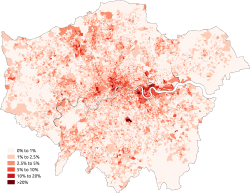Chinese community in London
| Part of a series on |
| Ethnic groups in London |
|---|
|
|
|
|
There is a Chinese community in London. There are 124,250 Chinese people in London, comprising 1.5% of the city's population. 33% of ethnic Chinese people in the United Kingdom reside in London.
As of 2000, more recent ethnic Chinese arrivals originated from Mainland China, Taiwan, and Vietnam while historically Chinese had migrated from Hong Kong, including the urbanised areas and the New Territories; Singapore; Malaysia; and elsewhere in southeast Asia.[1]
History
John Eade, the author of Placing London: From Imperial Capital to Global City, stated that a Chinese community representative stated that in the 1780s Chinese sailors visited London, being the first Chinese to visit London.[1] In the latter half of the 1800s the first wave of Chinese immigrants came to London. Chinese lived in Soho by the time World War II occurred.[1]
Another wave of Chinese immigration occurred in London during the 1950s and 1960s. The London economy prompted Chinese from many places to move, while changes in international rice markets prompted some Chinese from the New Territories of Hong Kong to move to London. During the same era, many Chinese moved from Whitehall to Soho.[1]
In the 1970s and 1980s many Chinese working in Soho continued to work there but began moving to suburbs. Non-Chinese began replacing the Chinese in Soho in the 1980s.[2] As of the late 1980s Soho remained the centre of the London Chinese community.[3] The Chinese were not involved in the development of the Soho LGBT community.[4]
Demographics

The report London's Population and the 2011 Census: First Report of Session 2009-10, Report, Together with Formal Minutes and Oral and Written Evidence stated that among recent migrants from China "many work long hours in the unregulated sector and many are entirely, and consensually, disenfranchised from public life in London."[5] Few of the Chinese migrants had formal leases or ownership of property. At the time, there were low levels of English literacy among the migrants.[5]
John Eade, author of Placing London: From Imperial Capital to Global City, wrote that "Chinatown remained one of the most important symbolic centres of community for Chinese across Britain."[6]
Institutions
There are Chinese community centres in Chinatown, Barnet, Camden, Hackney, Islington, Lambeth, Haringey and Tower Hamlets. Major organisations include the London Chinese Community Centre, London Chinatown Chinese Association, the London Chinese Cultural Centre.
The Ming-Ai (London) Institute focuses on better integrating the London's Chinese community with the wider London community. This is achieved by providing opportunities for British people to learn more about Chinese culture and raising awareness to issues which affecting Overseas Chinese.
Education
The Westminster Chinese Library, based at the Charing Cross Library (T: 查寧閣圖書館, S: 查宁阁图书馆, P: Chánínggé Túshūguǎn), holds one of the largest collections of Chinese materials in UK public libraries. It has a collection of over 50,000 Chinese books available for loan and reference to local readers of Chinese; music cassettes, CDs, and video films for loan; community information and general enquiries; a national subscription service of Chinese books; and Chinese events organised from time to time. The library also hosted a photography exhibition in 2013 as part of the British Chinese Heritage project, with photographs and stories of Chinese workers.[7]
Recreation
The London Dragon Boat Festival is held annually in June at the London Regatta Centre, Royal Albert Docks. It is organised by the London Chinatown Lions Club.[8]
Politics
Conservative Friends of the Chinese is the largest political organisation in London. CFOC is chaired by Geoffrey Clifton-Brown MP (Parliamentary Chairman) and Lord Wei of Shoreditch (Nat Wei).
References
- Eade, John. "Chinatown: Ethnicity, Community Organisation and the Competition for Resources." Placing London: From Imperial Capital to Global City. Berghahn Books, 2000. ISBN 1571818030, 9781571818034.
Notes
- 1 2 3 4 Eade, 73.
- ↑ Eade, p. 74.
- ↑ Eade, p. 75.
- ↑ Eade, John. Placing London: From Imperial Capital to Global City (Berghahn Series). Berghahn Books, 2000. p. 78. ISBN 1571818030, 9781571818034.
- 1 2 Great Britain Parliament House of Commons London Regional Committee. London's Population and the 2011 Census: First Report of Session 2009-10, Report, Together with Formal Minutes and Oral and Written Evidence (Volume 349 of HC (Series) (Great Britain. Parliament House of Commons Papers). The Stationery Office, 31 March 2010. ISBN 0215545621, 9780215545626. p. 113.
- ↑ Eade, John. Placing London: From Imperial Capital to Global City (Berghahn Series). Berghahn Books, 2000. p. 75. ISBN 1571818030, 9781571818034.
- ↑ "Libraries events archive 2013". City of Westminster. Retrieved 14 November 2013.
- ↑ "London Chinatown Lions Club", London Chinatown Lions Club, accessed 28 March 2011. Archived 27 March 2011.
- Some material originates from British Chinese
Further reading
- Ng, Kwee Choo (Institute of Race Relations). The Chinese in London. Published for the Institute of Race Relations by Oxford U.P., 1968. Available in Snippet Form at Google Books.
External links
- London Chinese Community Centre (CCC, 倫敦華人社區)
- Islington Chinese Association (ICA, 依士靈頓華人協會)
- British Chinese Society (BCS, 華英會)
- Conservative Friends of the Chinese
